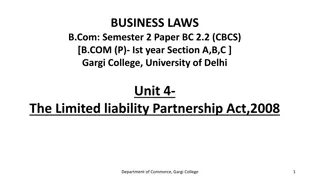Overview of Partnership Act 1932: Meaning, Elements, and Types
Partnership Act, 1932 governs the relationship between partners in a business. It defines partnership as an agreement between two or more individuals to share profits. The elements of partnership include two or more persons, an agreement, conducting business, sharing profits, and mutual agency. The act also classifies partners into active partners who participate in business operations and sleeping partners who do not engage in day-to-day activities.
Download Presentation

Please find below an Image/Link to download the presentation.
The content on the website is provided AS IS for your information and personal use only. It may not be sold, licensed, or shared on other websites without obtaining consent from the author.If you encounter any issues during the download, it is possible that the publisher has removed the file from their server.
You are allowed to download the files provided on this website for personal or commercial use, subject to the condition that they are used lawfully. All files are the property of their respective owners.
The content on the website is provided AS IS for your information and personal use only. It may not be sold, licensed, or shared on other websites without obtaining consent from the author.
E N D
Presentation Transcript
PRESENTATION ON BUSINESS LAW PARTNERSHIP ACT, 1932 MRS. MRS. SARLA SARLA SETHI SETHI ( ASSOCIATE PROF. IN COMMERCE ) ( ASSOCIATE PROF. IN COMMERCE ) SMS SMS KHALSA KHALSA LABANA LABANA GIRLS COLLEGE GIRLS COLLEGE BARARA BARARA ( (AMBALA AMBALA) )
MEANING AND DEFINITION OF PARTNERSHIP MEANING :-PARTNERSHIP IS THE RELATION BETWEEN TWO OR MORE PERSONS WHO HAVE AGREED TO SHARE THE PROFITS OF A BUSINESS CARRIED ON BY ALL OR ANY OF THEM ACTING FOR ALL. PARTNERSHIP IS AN AGREEMENT BETWEEN PERSONS HAVING CONTRACTUAL CAPACITY TO CARRY ON BUSINESS IN COMMON WITH A VIEW TO PRIVATE GAIN --H.L.HANEY
ELEMENTS OF PARTNERSHIP Two or more person An agreement Business Sharing of profits Mutual agency
1).Two or more persons :-To constitute a partnership there must be at least two persons. Partnership Act does not specify the maximum number of persons but the Indian Companies Act,2013 restricts the number of partners- In banking business:- member not exceed 10. In other business :- member not exceed 20. 2).An agreement :-without an agreement partnership cannot come into existence. Relation of partners arises from contract not from status. The agreement may be express or implied.
3).Business:- An association created primarily for charitable , religious, social purpose are not regarded as partnership. Business includes every trade, occupation and profession .A profession include :- architecture, legal practice, chartered accountant etc. 4).Sharing of profit :- The societies and clubs the object of which is not to earn profits, are not partnership. Profit means net profit i.e. The surplus money left after providing for all the expenses. The partners may agree to share profits in any manner they like.
5). Mutual agency :-A partner is both an agent and a principal .All the partners of a firm should be able to represent each other and by each other .Every partner has implied authority to bind the firm for his act done to carry on business in usual way.
TYPES OF PARTNERS 1)Active, Actual partner:- A partner who actively takes part in conduct of business. He acts as an agent of other partners. He must give public notice to the firm before his retirement. 2). Sleeping and dormant partner:- A partner that does not participate in the daily functioning of the partnership firm, i.e. he does not take an active part in the daily activities of the firm. He is however bound by the action of all the other partners. He will continue to share the profits and losses of the firm and even bring in his share of capital like any other partner.
3). Nominal partners:- These partners have no real interest in the affairs of the firm. These partners neither contribute to capital of firm nor take any part in its profits. They are known to be outsiders. 4).Partners in profit only :-A partner who is entitled to share in profits of the firm not liable for the losses . He does not participate in management of the company. 5).Sub- partner:- when a partner agrees to share his profit derived from firm with third person, that third person is called as sub-partner.
POSITION OF MINOR AS A PARTNER A person who is minor according to law may not be a partner in firm but with consent of all the other partners for time being he may be admitted to the benefits of partnership. Minor can be admitted to partnership firm if the following condition are fulfilled :- 1) before admission of minor as partner there must be an existing partnership. 2) must be mutual consent of all the partners. 3) minor admitted only to benefits of the partnership.
PARTNERSHIP DEED The document or instrument containing the agreement between partners is known as partnership deed .Each partner must keep a copy of deed. Contents of partnership deed: Name and address of firm Names and addresses of partners Type and nature of business the firm proposes to do Amount of capital to be contributed by partners Duration of partnership Interest on capitals and drawings Profit sharing ratio and salary Goodwill Date of commencement of partnership Settlement of accounts on retirement
DUTIES OF PARTNERS General duties: Every partner has the following general duties like carrying on the business to the greatest common good, duty to be just and faithful towards each other, rendering true accounts, and providing full information of all things affecting the firm. etc Duty to indemnify for fraud: Every partner has to indemnify the firm for losses caused to it by his fraud in the conduct of business. The Act has adopted this principle because the firm is liable for wrongful acts of partners. Any partner who commits fraud must indemnify other partners for his actions. Duty to act diligently: Every partner must attend to his duties towards the firm as diligently as possible because his not functioning diligently affects other partners as well. He is liable to indemnify others if his willful neglect causes losses to the firm.
DUTIES OF PARTNERS Duty to use the firm s property properly: Partners can use the firm s property exclusively for its business, and not for any personal purpose, because they all own it collectively. Hence, they must be careful while using these properties. Duty to not earn personal profits or to compete: Each partner must function according to commonly shared goals. They should not make any personal profit and must not engage in any competing business venture. They should hand over personal profits made to their firm.
RIGHTS OF PARTNERS Right to participate in business: Each partner has an equal right to take part in the conduct of their business. Partners can curtail this right to allow only some of them to contribute to the functioning of the business if the partnership deed states so. Right to express opinions: Another one of the rights of partners is their right to freely express their opinion. Partners, by a majority, can determine differences with respect to ordinary matters connected with the business. Each partner can express his opinion to decide such matters. Right to access books and accounts: Each partner can inspect and copy books of accounts of the business. This right is applicable equally to active and dormant partners
RIGHTS OF PARTNERS Right to share profits: Partners generally describe in their deed the proportion in which they will share profits of the firm. However, they have to share all the profits of the firm equally if they have not agreed on a fixed profit sharing ratio. Right to be indemnified: Partners can make some payments and incur liabilities through their decisions in the course of their business. They can claim indemnity from each other for these decisions. Such decisions must be taken in situations of emergency and should be of such nature that an ordinarily prudent person would resort to under similar conditions. Right to interest on capital and advances: Partners generally do not get an interest on the capital they contribute. In case they decide to take an interest, such payment must be made only out of profits.
















![Negligence Liability in Donoghue v. Stevenson [1932]](/thumb/198881/negligence-liability-in-donoghue-v-stevenson-1932.jpg)






